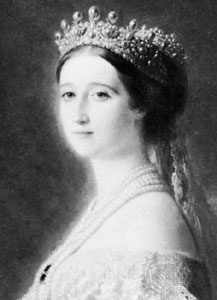Eugénie
empress of France
in full Eugénie, Comtesse (countess) de Teba, original name Eugénia María de Montijo de Guzmán
born May 5, 1826, Granada, Spain
died July 11, 1920, Madrid
 wife of Napoleon III and empress of France (1853–70), who came to have an important influence on her husband's foreign policy.
wife of Napoleon III and empress of France (1853–70), who came to have an important influence on her husband's foreign policy.The daughter of a Spanish noble who fought on the French side during Napoleon I's Peninsular War in Spain, Eugénie went to Paris when Louis-Napoléon became president of the Second Republic in December 1848. They were married in January 1853 after he had become the emperor Napoleon III.
On March 16, 1856, Eugénie gave birth to an imperial heir, Napoléon-Eugène-Louis Bonaparte. Concerned about the future of her family line, she began to take an active role in political affairs. On at least three occasions she served as regent (1859, 1865, 1870) in her husband's absence and was certainly more than just a figurehead. A devoted Roman Catholic, she supported Ultramontane causes (favouring a strong papacy) and opposed her husband's Italian policies that resulted in a loss of temporal power for the pope. She is often credited with having a preponderant voice in the decision to create a French-sponsored kingdom of Mexico (1861).
Eugénie, especially sensitive because of her origins, supported French opposition to a Prussian candidate for the vacant Spanish throne, in the controversy that precipitated the Franco-German War of 1870. After the Battle of Sedan (Sept. 1, 1870) she joined her family in exile in England and, after the death of her husband (1873), continued to play a dominant role in Bonapartist political activities. When her son died (1879), she assumed the role of the grande dame in exile.
- IUPAC names of unbranched alkanes
- Ivan Albright
- Ivan Aleksandrovich Goncharov
- Ivan Alekseyevich Bunin
- Ivan Andreyevich Kairov
- Ivan Andreyevich Krylov
- Ivan Asen I
- Ivan Asen II
- Ivan Bella
- Ivan Cankar
- Ivan Evstatiev Geshov
- Ivan Franko
- Ivan Galamian
- Ivan Gundulić
- Ivan Hrušovský
- Ivan I
- Ivan II
- Ivan III
- Ivan IV
- Ivan Klíma
- Ivan Kotlyarevsky
- Ivan Levitsky
- Ivan Logginovich Goremykin
- Ivan Matveyevich Vinogradov
- Ivan Mazepa